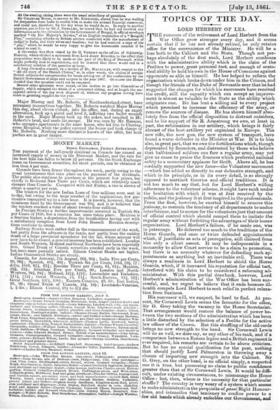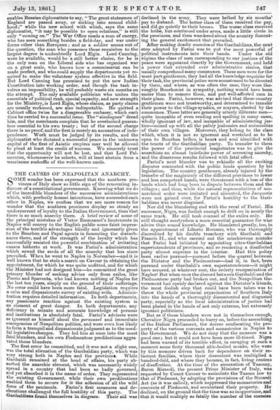TOPICS OF THE DAY.
LORD HERBERT OF LEA.
THE rumours of the retirement of Lord Herbert from the War Office grow stronger every day, and it seems certain that if he has not already retired, he only retains office for the convenience of the Ministry. He will be a loss both to the Cabinet and the State. Though not per- haps absolutely of the first rank, Lord Herbert combines with the administrative ability which is the claim of the Peelites to power, great personal tact, and enough of orato- rical ability to hold his own in the House of Commons against opponents as able as himself. He has helped to reform the organization which broke down under him in the Crimea, and though the friends of the Duke of Newcastle aver that he had suggested the changes for which his successors have received the credit, still the capacity which can accept an improve- ment is almost as valuable to the State as the ability which originates one, He has lent a willing aid to every project which promised to increase the efficiency of the army, or remove the sources of disease. He has shown himself abso- lutely free from the official disposition to distrust outsiders, and to his support of Sir R. Armstrong we owe, at least in part, the reformation in our artillery, which brings it fairly abreast of the best artillery yet organized in Europe. The new rifle, the new gun, the new system of transport, have found a warm defender in the Minister at War. It is to him also, in great part, that we owe the fortifications which, though deprecated by financiers, and distrusted by those who believe that half-trained soldiers can face a regular army, may yet give us cause to praise the firmness which preferred national safety to a momentary applause for thrift. Above all, he has cordially supported the new force—the Volunteer movement —which has added so directly to our defensive strength, and which in its principle, as in its every detail, is so strongly opposed to martinet theories and official traditions. It is not too much to say that, but for Lord Herbert's willing adherence to the volunteer scheme, it might have sunk under the hesitation with which it was at first received by the public, and the jealousy it at first inspired in the professionals. From the first, however, he exerted himself to remove this jealousy, to restrain the tendency of all departments to undue interference, and to secure for the volunteers just that amount of official control which should compel them to imitate the regular army without forfeiting the advantages of their looser organization. Lord Herbert's failure, if he made one, was in patronage. He deferred too much to the traditions of the Horse Guards, and once or twice defended appointments which, if justifiable as acts of prerogative, still claimed from him only a silent assent. It may be indispensable in a monarchy to allow Court service to be a claim to promotion, but there is no necessity whatever for defending such apL pointments as anything but an inevitable evil. There was always a readiness in Lord Herbert to shield the Horse Guards, which, if it increased his reputation for official tact, interfered with his claim to be considered a reforming ad- ministrator. With this partial drawback, however, Lord Herbert's administration of the 'War Office has been suc- cessful, and, we regret to believe that it ends because ill- health compels Lord Herbert to seek relief in perfect relaxa- tion from business.
His successor will, we suspect, be hard to find. At pre- sent, Sir Cornewall Lewis seems the favourite for the office, Sir G. Grey taking the vacancy in the Home Secretariat. That arrangement would restore the balance of power be- tween the two sections of the administration which has been a little disturbed by the selection of a Peelite for the active law officer of the Crown. But this shuffling of the old cards brings no new strength to the hand. Sir Cornewall Lewis will do as well, we dare say, as any other of his rank, and if a comparison between a Roman legion and a British regiment is ever required, his remarks are certain to be above criticism. But he has no special qualification for the post, nothing that should justify Lord Palmerston in throwing away a chance of importing new strength into the Cabinet. Sir G. Grey, on the other hand, is an official simply, a respected one it is true, but possessing no claim to public confidence greater than that of Sir Cornewall Lewis. It would be diffi- cult, under existing circumstances, to mismanage the Home Office : but, then, where is the necessity for that particular shuffle ? The country is very weary of a system which. seems to make administration the perquisite of passe Right Honour- ables, and intensifies that tendency to confine power to a few old heads which already enfeebles our Governments and enables Russian diplomatists to say, " The great statesmen of England are passed away, or sinking into second child- hood ;" while the new school with which, says the same diplomatist, "it may be possible to open relations," is still only "coming on." The War Office needs a man of energy, who has seen something besides a field-day, and war under forms other than European ; and as a soldier seems out of the question, the man who possesses these requisites to the largest degree is undoubtedly Lord Elgin. Lord Canning, were he available, -would be a still better choice, for he is the only man on the Liberal side who has organized war on a great scale, who knows how a commissariat can be made perfect, and who could supply the departments yet re- quired to make the volunteer system effective in the field. But Lord Canning has promised to put the new Indian Constitution into working order, and though the task in- volves an impossibility, he will probably waste six months on the attempt. The only available politician who unites the essentials of political rank, special capacity, and new strength for the Ministry, is Lord Elgin, whose claims, as party claims are usually reckoned, are also indisputable. He quitted a Cabinet office twice for a disagreeable embassy, which each time he carried to a successful issue. The " sinologues" dread him, and the merchants complain that he overlooked guaran- tees essential to his own treaty ; but of the second charge there is no proof, and the first is merely an accusation of inde- pendence. Work must be judged by its results, and the diplomatist who dictated a successful peace in the unknown capital of the first of Asiatic empires may well be allowed to plead at least the credit of success. We sincerely trust that the opportunity will not be lost, and that Lord Pal- merston, whomsoever he selects, will at least abstain from a wearisome reshuffle of the well-known cards.































 Previous page
Previous page